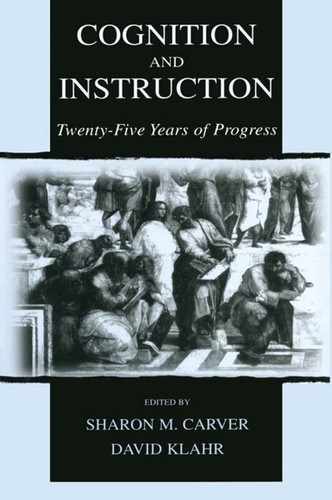Acknowledgments
The symposium that is the basis for the chapters in this volume was generously funded by the Office of Naval Research and the Directorate for Education & Human Resources at the National Science Foundation. The Psychology Department and the Children's School at Carnegie Mellon University also supported the conference in diverse ways. We thank Mary Anne Cowden, Anna Marie Joyce, Queenie Kravitz, Donna Perovich, and Jolene Watson for their valuable assistance in organization prior to the conference and for their gracious hostessing during it.
We extend our deep appreciation to each of the symposium participants. The contributors of chapters for this volume made our jobs easier by preparing their materials in a timely fashion and improved the quality of the work by reviewing each others' chapters and revising their own according to their peers' feedback. Bennett Bertenthal, Susan Chipman, Shari Ellis, and Michele Gregoire contributed significantly to the symposium via presentations that are, unfortunately, not represented in this volume. Thanks also to the Junior Scientists—supported by the Directorate for Education & Human Resources at NSF—who enriched the intellectual dialogue at the symposium by their active participation: Alla Keselman (Columbia), Eugene Matusov (University of Delaware), Anandi Nagarajan (Rutgers University), Mitchell Nathan (University of Colorado), Michael Nussbaum (California State University), Michelle Simmons (University of Florida), Judith Sinclair (Catholic College of America), Gregg Solomon (MIT), John St. Julien (University of Delaware), Michelle Stephan (IPFW), Joyce Tang Boyland (Alverno College), Aaron Yarlas (Ohio State / UCLA), and Corinne Zimmerman (University of Alberta).
Sadly, the excitement and optimism with which this project was conceived and executed has been associated with two tragic losses. Just a week prior to the symposium, Ann Brown, who had been scheduled to be one of the discussants, died after a very brief illness. We are grateful to Buz Hunt for selflessly agreeing to serve as a discussant on very short notice and to Annemarie Palincsar, who graciously honored Ann with a moving tribute—included in this volume (p. xi)—at the opening session of the symposium. The second blow came a little over a year later, as the chapters were being copy edited, when Robbie Case—another major contributor to the field, and a participant in the symposium (chap. 1) suddenly died. Although the field has lost two of its most prolific and influential contributors, perhaps there is some comfort in knowing that their work has inspired others to continue to advance our knowledge about the intersection of cognition and instruction.
Each of the editors, Sharon Carver and David Klahr, would like to publicly express to the other a note of appreciation for being such an excellent colleague and collaborator, from the very beginning of this project to this final stage (introductions are always written last, placed first, and remembered not at all!). We both consider ourselves fortunate to have had the opportunity to work on a project in which both the product and the process were of such high quality.
In addition, Sharon Carver would like to express her gratitude to each of the Children's School staff members, children, families, and undergraduates, all of whom are part of her continuing opportunities for integrating cognition and instruction. More importantly, she wants her husband, Dave, and daughter, Ariel, to know how much she values them for calmly supporting her efforts on multiple simultaneous projects and for encouraging her to balance her work with family activities. David Klahr expresses deep appreciation to his wife, Pam, and his children, Anna, Joshua, Sophia, and Benjamin, for their continual support and encouragement on this and many other endeavors.
—Sharon M. Carver
—David Klahr
Carnegie Mellon University Pittsburgh, Pennsylvania
REFERENCES
Bruer, J.T. (1993). Schools for thought: A Science of learning in the classroom. Cambridge, MA: MIT Press.
Glaser, R. (Ed.). (1965). Training research and education. New York: Science Editions, Wiley. (Original work published in 1962.)
Glaser, R. (1976). Cognitive psychology and instructional design. In D. Klahr (Ed.), Cognition and instruction. Hillsdale, NJ: Lawrence Erlbaum Associates.
Klahr, D. (Ed.). (1976). Cognition and instruction. Hillsdale, NJ: Lawrence Erlbaum Associates.
Larkin, J.H. (1994). Foreword. In K. McGilly (Ed.), Classroom lessons: Integrating cognitive theory and classroom practice. Cambridge, MA: MIT Press.
McGilly, K. (Ed.). (1994). Classroom lessons: Integrating cognitive theory and classroom practice. Cambridge, MA: MIT Press.
